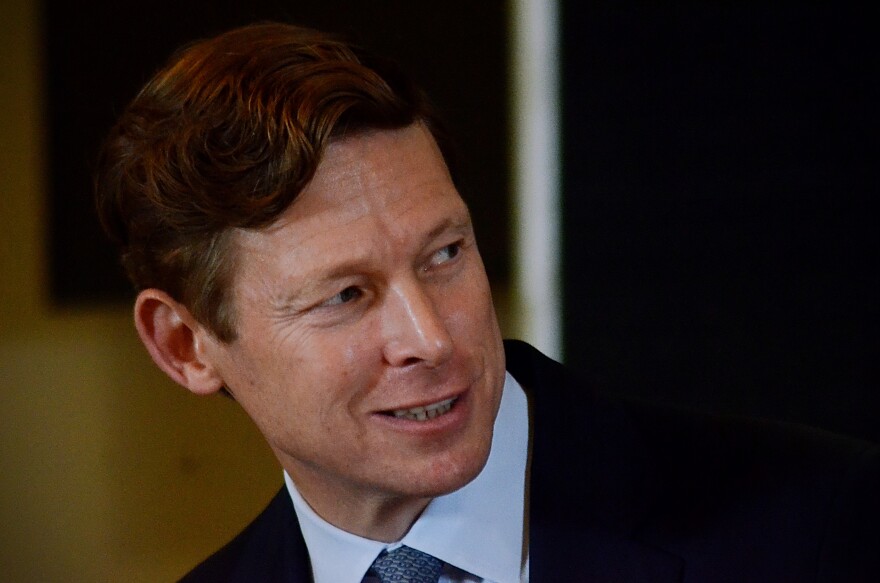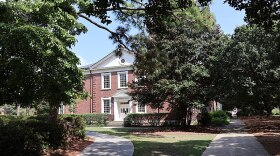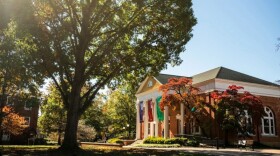For the first time in nine years, the UNC Board of Governors is allowing public universities to increase tuition for in-state students. UNC-Chapel Hill's Board of Trustees have decided they do not want to take that offer.
In a Wednesday budget and finance meeting, all but one member voted to reject a university proposal to increase resident undergraduate tuition by 3%. The proposal would have raised tuition by $211 a year for the incoming 2026 class — an about $800,000 increase in the university's annual revenue.
The committee unanimously voted, however, to raise out-of-state undergraduate tuition by 10%. They also directed university staff to come up with a proposal for graduate nonresident students to fund a tenth year of flat in-state undergraduate tuition.

The committee meeting lasted nearly two hours and at times became contentious, with board members citing various reasons driving their decision.
Some board members believe a resident undergraduate tuition increase would go against the state constitution to make higher education as “free as practicable” for North Carolinians.
Budget and Finance Committee Chair Marty Kotis said he believes the university must explore all other options before increasing in-state tuition.
"I know the System guidance is 3% (increase) and what our sister institutions, so far I've heard, are all doing is taking the 3%," Kotis continued. "Well, just because everybody else jumps off the bridge, we don't need to. I think we need to show decisive leadership here."
Other committee members said they wouldn't mind a tuition increase for in-state students, as long as there was a guarantee that money would stay on Chapel Hill's campus.
In September, the UNC Board of Governors approved a new performance funding model for its 16 universities. Previously, the state legislature allocated money to universities for meeting certain performance metrics set by the UNC System. This ranged from graduating students on time to improving student debt costs.
When the legislature passed the last state budget, however, it expressed concerns about the methodology behind the BOG's funding model. Legislators decided to only approve non-recurring funds to cover 2023-2025 costs. This prompted the BOG to update its model ahead of the next state budget.
Now, universities all contribute to a $30 million performance funding pool. The BOG then reallocates that money based on how universities improve their number of degree completions.
The updated model led to significant increases in funding for some schools like UNC Charlotte, UNC Greensboro, and UNC Wilmington, which the BOG awarded close to or more than $1 million each.
The BOG, however, took nearly $7 million away from UNC-Chapel Hill. UNC Board of Trustee member Jim Blaine believes this is because of UNC's spending habits.
"Effectively, administrative bloat and wasteful spending was the rationale of the System Office cutting us," Blaine said during Wednesday's BOT committee meeting.

Blaine said last year the UNC-Chapel Hill BOT voted to raise out-of-state tuition by 10% and through the UNC BOG’s performance model, that money went to fund programs at other campuses. He didn't want the same to happen with resident dollars.
"It's really hard for me to ask our students and our Carolina families to pay more to fund programs in Raleigh and Cullowhee and Boone," Blaine said. "I got a problem with that."
So, instead, the committee voted for university staff to rework its suggestion of a 3% in-state tuition increase into a "revenue neutral" proposal. This plan involves raising tuition for graduate nonresident students to make up the $800,000 that would have come from resident undergraduate students.
Not every trustee agreed with keeping resident tuition flat. Ralph Meekins said he believes an increase is necessary to ensure UNC remains competitive and the board should take advantage of the BOG letting up on the freeze.
"After nine years of saying you can't do it — they're saying you can — and I would take that as a recommendation that we should," Meekins said at the BOT committee meeting. "I think (the BOG) recognizes that after nine years of stagnant growth in our tuition, it's time to set the baseline going forward."
At the meeting, he asked Chancellor Lee Roberts for his opinion on the issue. Roberts said his team is already trying to grapple with the state legislature not passing a state budget, which has left a funding gap.

"We don't have enrollment funding for the current sophomores or for the current freshmen," Roberts said at the BOT committee meeting. "The entire System has been trying to convince the General Assembly of the need for enrollment funding."
"I worry about a dynamic in which we're telling the General Assembly that we need the enrollment funding very badly and they turn around and say 'well, you didn't use the tools we gave you to help yourself with a tuition increase," Roberts continued.
UNC-Chapel Hill's Student Body President Adolfo Alvarez also brought up a concern that continuing to increase out-of-state tuition could unnecessarily place a burden on students who are the neediest.
"A lot of students are concerned about what the admissions process will look like for out-of-state students and if there's going to be socioeconomic diversity within the out-of-state student body," Alvarez said. "There's demand, so students will continue to apply to the university and we will always be able to fill those spots… (but) I am concerned that we will become too elitist for the out-of-state population."
Alvarez suggested implementing a fixed tuition initiative for out-of-state students, similar to a UNC System program for in-state students that guarantees their tuition rate for eight consecutive semesters.
Trustee Blaine said it isn't North Carolina's responsibility to cover tuition costs for out-of-state students.
"I'm sympathetic to your situation, but the principle there needs to be that they need to pay a market rate," Blaine said. "They need to pay what it takes to educate them, so the state taxpayers aren't subsidizing them."
Blaine did say, however, that the UNC BOG will make the final decision about tuition costs for all students.
"The UNC Board of Governors can do whatever they want to – they can supersede us in a heartbeat," Blaine said. "We are little gnats compared to the authority that is vested in that body. So, I think we can ask them not to take any of the money that we're trying to generate here and we can try to ask that there be a contingency on it, but they can do whatever they want to."
UNC-Chapel Hill plans to bring a new tuition proposal to the full board of trustees tomorrow.
Several other UNC System universities are also meeting to consider raises to resident undergraduate tuition. NC State's Chancellor, Kevin Howell, plans to present a tuition increase proposal to his university's affairs committee tomorrow.
WUNC partners with Open Campus and NC Local on higher education coverage.











